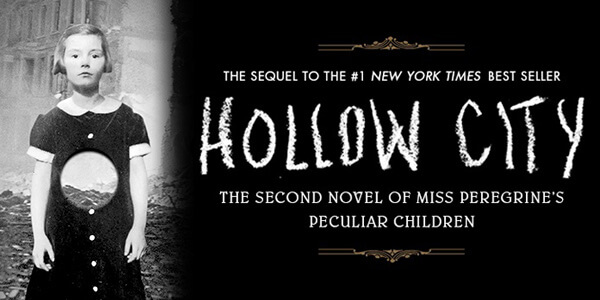HOLLOW CITY
By Ransom Riggs
Narrated by Kirby Heyborne
CD: Blackstone Audio, 2014. (11 hrs, 39 mins) $29.95
 Miss Peregrine’s Home for Peculiar Children, the first installment of Ransom Riggs’ Peculiar Children series, was a surprise best-seller in 2011. Like many of the best Young Adult books, the novel pulled no punches: war, death, betrayal, identity, and trust were all explored, often in a difficult context. Even the structure of the book was challenging, with false starts and a long-delayed introduction to the main focus of the narrative. Yet the book was gripping. The “unique selling proposition” (to borrow some marketing lingo) of vintage photographs, described in the narrative and strewn through the text, added to the appeal—perhaps many even speculated when exploring these strange photos how Riggs developed his characters and dreamlike narratives. Now Riggs has written a second book in the series: Hollow City.
Miss Peregrine’s Home for Peculiar Children, the first installment of Ransom Riggs’ Peculiar Children series, was a surprise best-seller in 2011. Like many of the best Young Adult books, the novel pulled no punches: war, death, betrayal, identity, and trust were all explored, often in a difficult context. Even the structure of the book was challenging, with false starts and a long-delayed introduction to the main focus of the narrative. Yet the book was gripping. The “unique selling proposition” (to borrow some marketing lingo) of vintage photographs, described in the narrative and strewn through the text, added to the appeal—perhaps many even speculated when exploring these strange photos how Riggs developed his characters and dreamlike narratives. Now Riggs has written a second book in the series: Hollow City.
Where Miss Peregrine’s Home opened slowly, Hollow City hits the ground running, beginning right where the first novel left off. The children, having escaped from the island of Cairnholm and having left the time loop that had kept them safe, now manage to evade the immediate pursuit of the “hollowgasts” and their attendant “wights,” and arrive on the mainland, knowing that while they were at sea they were stalked by a U-boat and, now on land, will be hunted by zeppelins. (It’s complicated. Do keep up.)
On one level, Hollow City is structured as quest, with the use of time travel to propel the action forward. Yet the author also uses his narrative and the context of war to explore good and evil, and the moral ambiguities of warfare. Riggs doesn’t follow the standard cliché of a World War II setting by allying the evil hollowgasts and wights with the Nazis. Instead, the wights—terrifying servants of the hollowgasts—will work within any group that suits them, as the evils of war are perpetrated by both sides. Even the peculiar children and the “ymbrynes” who guard them can be morally ambiguous. If Miss Peregrine’s Home asked whether it is right to safely imprison oneself and others, no matter how beautiful life within the prison may be, then Hollow City questions the nature of responsibility and sacrifice. But the chase and the quest are what keep the reader (or listener) engaged. It’s a bit of a “one-damn-thing-after-another” book. Every apparent haven the children reach holds more danger and they are running for their lives right up to the final word. In fact, there is no real sense of an ending. Like Miss Peregrine’s Home, the book simply stops rather than arrives at an orchestrated conclusion, clearly set up for the next installment of the series.
The audiobook is narrated by Kirby Heyborne. He reads slowly, almost leisurely (over eleven hours), which enhances the dreamlike quality of the narrative. He gives different voices to each of the children. In terms of accents, the central character is an American named Jacob, which is easy enough for Heyborne, but the other children are British, presenting the British listener, at least, with a slight problem as the accents are sometimes unrecognizable or not convincing. (Emma, for example, speaks with a strange drag. And there is a very odd attempt at Cockney.) On the other hand, if James Marsters got away with his Cockney-London-Estuary mash-up in the TV show Buffy the Vampire Slayer, then perhaps Heyborne can be forgiven. Audiobooks lack the signposting—paragraph breaks, section breaks, and white space—that print books offer a reader. Heyborne uses his voice well to guide the listener through the book, enhancing the excitement with the quality of his delivery, and, despite the problems identified above, usually differentiating among the characters, thereby avoiding a lot of the confusion inherent in a large cast. One question that the audiobook immediately presents is this: will the book work without its unique vintage photographs? The answer is clear: yes it does. The images are an attractive embellishment, but they are not essential to the narrative.
The next book in the series is due out later this year. Riggs now needs to move on from endless chase and peril and establish his fictional world more clearly, if the series is to avoid becoming repetitive.
—Danuta Reah
